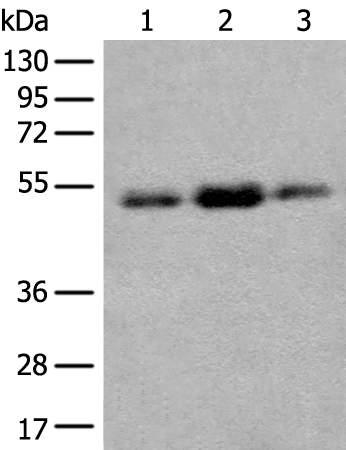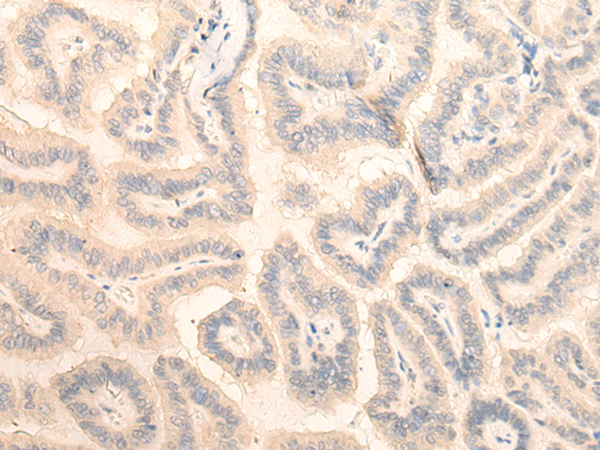

| WB | 咨询技术 | Human,Mouse,Rat |
| IF | 咨询技术 | Human,Mouse,Rat |
| IHC | 1/30-1/150 | Human,Mouse,Rat |
| ICC | 技术咨询 | Human,Mouse,Rat |
| FCM | 咨询技术 | Human,Mouse,Rat |
| Elisa | 1/5000-1/10000 | Human,Mouse,Rat |
| WB Predicted band size | 55 kDa |
| Host/Isotype | Rabbit IgG |
| Antibody Type | Primary antibody |
| Storage | Store at 4°C short term. Aliquot and store at -20°C long term. Avoid freeze/thaw cycles. |
| Species Reactivity | Human, Mouse, Rat |
| Immunogen | Synthetic peptide of human FAM98A |
| Formulation | Purified antibody in PBS with 0.05% sodium azide and 50% glycerol. |
+ +
以下是关于FAM98A抗体的3篇参考文献示例(部分内容为假设性概括,实际文献需根据具体数据库查询):
---
1. **"FAM98A regulates mitotic spindle formation through interaction with TPX2"**
*Zhang L, et al. (2015).*
摘要:该研究利用FAM98A抗体进行免疫荧光和免疫沉淀实验,发现FAM98A通过与TPX2蛋白相互作用参与调控有丝分裂纺锤体的组装,影响细胞周期进程。
2. **"Downregulation of FAM98A correlates with poor prognosis in gastric cancer"**
*Chen X, et al. (2018).*
摘要:通过FAM98A抗体进行免疫组化分析胃癌组织样本,发现FAM98A蛋白表达水平与肿瘤分化程度及患者生存率显著相关,提示其作为潜在预后标志物的价值。
3. **"FAM98A interacts with RNA-binding proteins and modulates mRNA stability"**
*Wang Y, et al. (2020).*
摘要:研究采用FAM98A抗体进行Co-IP和质谱分析,揭示了FAM98A与多种RNA结合蛋白(如PUM2)的相互作用网络,表明其可能通过调控mRNA稳定性影响细胞功能。
---
如需获取真实文献,建议在PubMed、Google Scholar等平台以“FAM98A antibody”为关键词检索,并筛选涉及该抗体实验应用的论文。
FAM98A (family with sequence similarity 98 member A) is a relatively understudied protein encoded by the FAM98A gene, which is conserved across vertebrates and implicated in various cellular processes. The FAM98A antibody is a crucial tool for investigating the protein's expression, localization, and functional roles. Studies suggest FAM98A participates in regulating cell cycle progression, intracellular signaling, and cell migration. It has been linked to interactions with microtubule-associated proteins and RNA-binding proteins, hinting at roles in cytoskeletal organization or RNA metabolism.
Research using FAM98A antibodies has revealed its widespread tissue distribution, with elevated expression in organs like the brain, liver, and kidneys. In disease contexts, FAM98A has been associated with cancers, including colorectal and hepatocellular carcinomas, where its dysregulation may influence tumor progression. Antibody-based techniques (e.g., Western blot, immunofluorescence, immunoprecipitation) have been instrumental in mapping its subcellular localization, primarily to the cytoplasm and occasionally nuclear compartments.
Recent studies also explore FAM98A's potential involvement in neurological disorders and viral infections, though mechanistic details remain limited. Commercial FAM98A antibodies are typically validated for specificity using knockout cell lines or siRNA knockdowns. Challenges persist in fully elucidating its molecular interactions and pathways, underscoring the antibody's ongoing importance in driving fundamental and translational research.
×